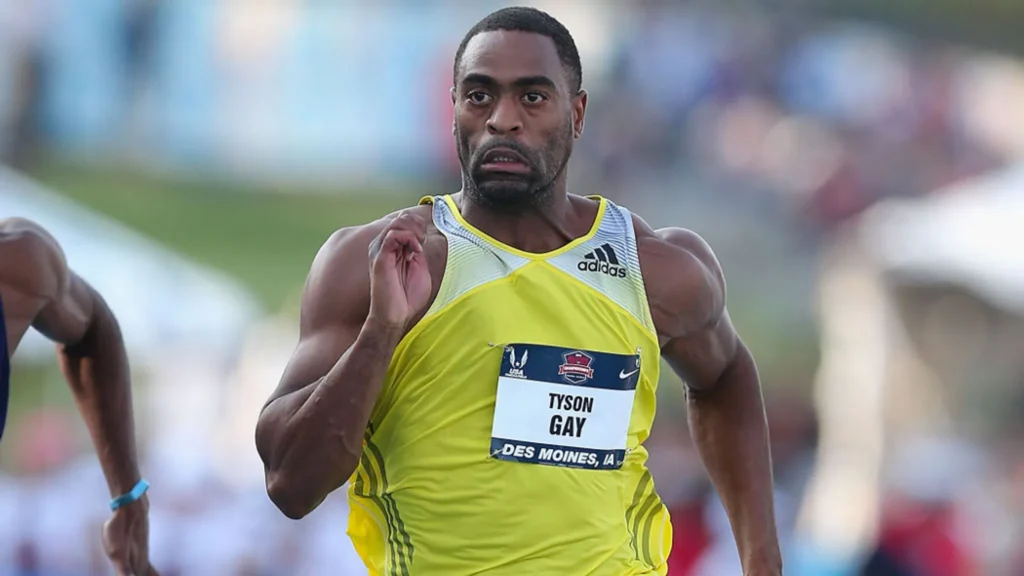The world of track and field has seen many great athletes, but few have captured the public’s attention like American sprinter Tyson Gay. Known for his explosive speed and competitive spirit, Gay rose to become one of the fastest men in history. He left an indelible mark on the sport, holding the American record in the 100-meter dash and consistently challenging the world’s best.
This article explores the career, achievements, and enduring legacy of Tyson Gay, a sprinter who defined an era of American track and field with his remarkable talent and perseverance. From his early days in Kentucky to the global stage of the Olympics and World Championships, his journey is one of triumph, adversity, and pure, unadulterated speed.
Table of Contents
Key Takeaways
- Tyson Gay is the American record holder in the 100-meter dash with a time of 9.69 seconds.
- He achieved a historic triple gold medal win at the 2007 World Championships in the 100m, 200m, and 4x100m relay.
- Gay is one of the few athletes to have run under 10 seconds in the 100m, 20 seconds in the 200m, and 45 seconds in the 400m.
- His career was marked by intense rivalries with sprinters like Usain Bolt and Asafa Powell.
- Despite facing significant injuries and controversies, Gay’s impact on American sprinting remains profound.
The Early Rise of a Track Star
Tyson Gay was born on August 9, 1982, in Lexington, Kentucky. From a young age, athleticism was a part of his life. His mother and grandmother were both competitive runners, and his older sister, Tiffany, was also a successful high school sprinter. This family environment nurtured his competitive drive. Encouraged by his mother, Gay often raced against his sister, pushing himself to improve his speed and technique.
During his time at Lafayette High School, Gay began to show his true potential. He worked with coach Ken Northington to refine his natural talent, focusing on his rhythm and form. By his senior year, he was a dominant force, winning the state championship in the 100 meters and setting a new championship record. His success in high school was just the beginning of a long and storied career. He demonstrated the raw ability and determination that would eventually make him a world-renowned American sprinter Tyson Gay.
Collegiate Career and Turning Pro
After high school, Gay attended Barton County Community College. Here, he continued to develop under the guidance of coach Lance Brauman. His times in the 100m and 200m events dropped significantly, and he won a national junior college championship. It was also at Barton County that he met and trained with Jamaican sprinter Veronica Campbell-Brown, forming a partnership that benefited both athletes.
He later transferred to the University of Arkansas, where he had his first taste of NCAA competition. In 2004, he became the first athlete from the university to win the NCAA 100-meter title. His performances helped his team secure the overall NCAA Championship. After a successful amateur career, Gay made the decision to turn professional in 2005. This move set him on a path to compete against the best sprinters in the world and establish his legacy on the international stage.

Breaking Through on the World Stage
Tyson Gay’s professional debut season in 2005 immediately showed he belonged among the elite. He placed fourth in the 200m at the World Championships in Helsinki, finishing just behind three of his American teammates. He ended the season on a high note, winning the gold medal in the 200m at the World Athletics Final. This victory was his first major international title and a sign of what was to come.
The Phenomenal 2007 Season
The year 2007 was a defining moment for the American sprinter Tyson Gay. He entered the season with a new coach, Jon Drummond, and a clear goal: to challenge the world’s best. At the U.S. National Championships, he put on a stunning display. He won the 100m with a time of 9.84 seconds, running into a headwind. He followed that with an incredible 19.62-second performance in the 200m, the second-fastest time in history at that point.
A Historic Triple at the World Championships
Gay carried this momentum into the 2007 World Championships in Osaka, Japan. The 100m final was one of the most anticipated races of the year, pitting him against world record holder Asafa Powell. Gay won, claiming his first world title in the event with a time of 9.85 seconds. He didn’t stop there. He went on to win the 200m in a championship record time of 19.76 seconds. To complete the trifecta, he anchored the U.S. 4x100m relay team to victory, securing his third gold medal of the championships. This remarkable feat made him only the second man in history to win all three events at a single World Championship.
Tyson Gay: The American Sprinter 100 Meter Tyson Record Holder
One of Tyson Gay’s most lasting achievements is his American record in the 100-meter dash. While he ran a wind-aided 9.68 seconds at the 2008 U.S. Olympic Trials, his official record was set in 2009. At the Shanghai Golden Grand Prix, Gay clocked an astonishing 9.69 seconds. This performance cemented his status as the fastest American sprinter 100 meter Tyson Gay and tied him for the second-fastest man ever at the time.
The Significance of 9.69 Seconds
Breaking the 9.70-second barrier is a rare feat in sprinting. Gay’s 9.69-second run showcased his incredible top-end speed and technical prowess. This record has stood for over a decade, a testament to his exceptional talent. It remains a benchmark for all aspiring American sprinters and a highlight of a career filled with incredible moments. His ability to produce such a fast time, particularly during an era dominated by Usain Bolt, speaks volumes about his competitive greatness.
Rivalries with Bolt and Powell
American Sprinter Tyson’s career unfolded during a golden age of sprinting, defined by his intense rivalries with Jamaican sprinters Usain Bolt and Asafa Powell. These competitions produced some of the most exciting races in track and field history and pushed the athletes to achieve incredible times.
The Battle for Supremacy
While Asafa Powell was the dominant force in the mid-2000s, it was the emergence of Usain Bolt that created the era’s most compelling rivalry. Gay’s peak in 2007 saw him defeat both Jamaicans. However, Bolt’s world-record-breaking performances at the 2008 Beijing Olympics set a new standard.
The 2009 World Championships 100m final is a perfect example of this rivalry. Bolt won with a stunning world record of 9.58 seconds, but American Sprinter Tyson finished second with a new American record of 9.71 seconds. It was the fastest non-winning time in history and highlighted the incredible level of competition.
A Memorable Victory
Despite Bolt’s dominance, Gay had his moments of triumph. In 2010, at the DN Galan meet in Stockholm, Gay handed Bolt his first 100m defeat in two years. He won the race decisively with a time of 9.84 seconds. This victory was a significant achievement and a reminder that on any given day, the tyson american sprinter was capable of beating anyone in the world. These rivalries not only defined their careers but also elevated the sport’s popularity globally.
Overcoming Adversity: Injuries and Setbacks to American Sprinter Tyson
Throughout his career, American Sprinter Tyson faced numerous challenges, including significant injuries that often struck at the most critical times. His ability to come back from these setbacks demonstrated his resilience and deep love for the sport. A severe hamstring injury during the 200m trials for the 2008 Beijing Olympics cost him a chance to compete in that event and hampered his performance in the 100m.
Later, a nagging hip injury required surgery in 2011, forcing him to miss nearly a year of competition. Yet, he fought back to make the 2012 Olympic team. In the London Olympic 100m final, he finished fourth, missing a bronze medal by just one-hundredth of a second in the fastest Olympic final ever. In 2013, Gay’s career faced another major setback when he tested positive for a banned substance. He accepted a one-year suspension and had his 2012 Olympic silver medal from the 4x100m relay stripped. Despite these hardships, Gay returned to the track and continued to compete at a high level.
The Legacy of an American Sprinting Icon
American Sprinter Tyson’s legacy in track and field is multifaceted. He is remembered not only for his records and medals but also for his quiet determination and the thrilling rivalries he was a part of. He was a versatile sprinter, one of the first to break 10 seconds for the 100m, 20 seconds for the 200m, and 45 seconds for the 400m, showcasing his incredible range.
His 2007 World Championship triple gold remains a historic achievement in American athletics. He inspired a generation of sprinters and proved that U.S. athletes could compete with the very best on the world’s biggest stages. His American record of 9.69 seconds continues to be the standard for speed in the United States. Though his career had its share of highs and lows, the impact of American sprinter Tyson Gay on the sport is undeniable.
What is Tyson Gay Doing Now?
Since stepping away from elite-level competition, American Sprinter Tyson has remained involved in the sport. He has explored coaching and mentoring younger athletes. He also made a brief attempt to join the U.S. bobsled team in 2016, following in the footsteps of other track stars. In his personal life, American Sprinter Tyson tragically lost his 15-year-old daughter, Trinity, in 2016, an event that deeply affected him and his community. Today, he focuses on his family and finding new ways to contribute to the sport he loves.
Conclusion of American Sprinter Tyson
Tyson Gay’s career is a powerful story of talent, hard work, and the will to overcome adversity. American Sprinter Tyson, he reached the pinnacle of the sport, setting records that still stand today and winning titles on the world’s grandest stages. His duels with Bolt and Powell created unforgettable moments that captivated millions.
While American Sprinter Tyson’s journey was not without its difficult chapters, his contributions to track and field are undeniable. Tyson Gay will forever be remembered as one of the fastest and most resilient athletes in American history, a true icon of speed.
Frequently Asked Questions about American Sprinter Tyson
What is Tyson Gay’s fastest 100m time?
Tyson Gay’s fastest official 100m time is 9.69 seconds, which is the American national record. He ran this time on September 20, 2009, in Shanghai.
Did Tyson Gay ever win an Olympic medal?
Tyson Gay was part of the U.S. men’s 4x100m relay team that won a silver medal at the 2012 London Olympics. However, this medal was later stripped due to a doping violation. His Olympic experiences have been marked by near misses and unfortunate circumstances, including finishing fourth in the 100m final in 2012.
How many gold medals did Tyson Gay win at the World Championships?
Tyson Gay won three gold medals at the 2007 World Championships in Osaka, Japan. He won the 100m, 200m, and 4x100m relay, a rare and historic achievement.
Who were Tyson Gay’s main rivals?
His main rivals were Jamaican sprinters Usain Bolt and Asafa Powell. Their competitions throughout the late 2000s and early 2010s produced some of the fastest races in history and defined a golden era for men’s sprinting.
What is the legacy of the American sprinter Tyson Gay?
The legacy of American sprinter Tyson Gay includes being the American record holder in the 100m, his triple gold medal performance at the 2007 World Championships, and his role in the highly competitive sprinting era alongside Usain Bolt. He is remembered for his incredible speed, resilience, and contributions to U.S. track and field.

Leave a Reply